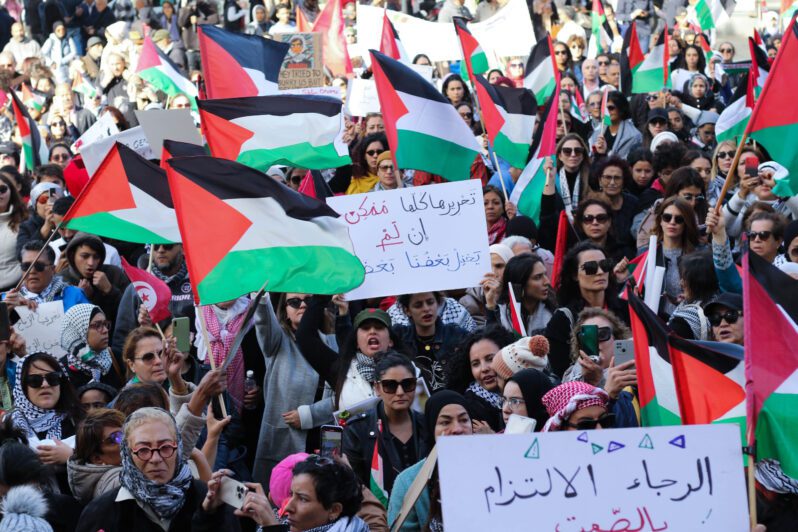Tunisia in a State of Emergency: Fear from Terrorism … and for Freedom

On July 4, 2015, Tunisian President Beji Caid Essebsi declared a state of emergency in Tunisia. The state grants the executive government, via the Minister of Interior and the governor, important powers that even include the power to impose curfews, house arrests, and authorize searches of residences without judicial warrants. In his televised speech, the president justified the declaration on the basis of the collapse of the economic situation (which stems from social movements, most of which he considered illegal), the challenges facing the government, and terrorism. The statement accompanying the declaration, however, merely cited the terrorist threat as the reason for the state of necessity justifying the declaration. It expressed that terrorism is now threatening the stability of the state, and was issued in the wake of the two operations that targeted the tourist resort in Sousse on June 26, 2015, and the Bardo National Museum on March 18, 2015. Among the dangers it listed, the statement also referred to the spread of groups considered to be terrorist organizations southward in Libya in the vicinity of the Tunisian border.
A review of legislative activity over the past month provides a number of indications that the state of legislative emergency began before the state of emergency itself was declared. In his first reaction to the Sousse incident, parliament speaker Mohamed Ennaceur pledged that parliament will approve the counter-terrorism bill in the session set to convene on July 25, 2015, which coincides with anniversary of the declaration of the Tunisian Republic.[1] This pledge led the parliamentary committees to accelerate their work on the bill in a manner that prompted rights activist Professor Bochra Belhaj Hmida, chair of Parliament’s Freedoms and Human Rights Committee, to express her fear that this haste will result in the bill conflicting with the contents of the Constitution.[2]
This expression of fear follows joint preparations by Parliament’s Bureau and the government aimed at preventing the introduction of legislative reforms that could conflict with the counter-terrorism law, and jeopardize its exceptional provisions. On June 22, 2015, the Tunisian government withdrew bill no. 13 of 2013, which revised and completed parts of the Code of Criminal Procedure’s provisions. Similarly, on July 2, 2015, the same government withdrew the bill for organic law no. 55 of 2014, which concerned the right to access information. In other words, the government withdrew two bills that it had previously included in the list of 24 bills whose examination it had asked parliament to expedite. The bills were withdrawn after parliament’s technical committees had finished discussing them, at which point the committees were supposed to refer them to the Legislative Council’s general session for approval. This move by the government can only be understood by connecting it to the counter-terrorism bill and hence, the war against terrorism.
The Minister of Justice openly justified his request to withdraw the bill revising the Code of Criminal Procedure by stating that both the Ministry of Justice and Parliament’s Bureau “thought it beneficial to further study and scrutinize all aspects of this legal text, particularly the guarantees given to people held in pre-charge detention and the presence of a lawyer from the first hours of their arrest”.[3] The minister added that this would take no more than a few days, and that the bill was then expected to be reincorporated into parliament’s work schedule based on its priorities.
The minister’s statement made the guarantees provided to suspects held in pre-charge detention by the judicial police conditional on the withdrawal of the bill. He then tied the resumption of debate over the bill (after its amendment) to parliament’s work calendar. Hence, it seems clear that the withdrawal of the bill was related to the examination of the counter-terrorism bill. The counter-terrorism bill extends the period in which suspects can be held in pre-charge detention to five days, renewable once. The bill revising the Code of Criminal Procedure, on the other hand, would have revised article 13 bis of said code in a manner that reduces pre-trial detention by security forces from three days, renewable once, to 48 hours renewable once via a justified judicial decree. The bill revising the Code of Criminal Procedure also enshrined the right of people in pre-charge detention to contact their lawyers upon their arrest. Hence, the philosophy of the counter-terrorism bill clearly clashes with the rights-based vision espoused by the bill that revises the Code of Criminal Procedure. To facilitate the exceptional provisions that the counter-terrorism law will include, the government and Parliament’s Bureau chose to sacrifice reforming the Code of Criminal Procedure. The bill for the right to access information, which would have consecrated the right to request information from administrative authorities, and prevented the concealment of information concerning human rights violation, was sacrificed in the same manner; the general feeling inside the government and parliament that exceptional provisions are needed to guarantee success in the war against terrorism meant that, it too had to be withdrawn.
Terrorist-designated acts have disrupted the emergence of a Tunisian democracy. They have prompted the declaration of a state of emergency, and it is not yet clear what exceptional measures this state of emergency will produce. The so-called fight against terrorism have also disturbed the trend in the Tunisian parliament towards reforming the legislative system and has bred legislative enthusiasm for issuing exceptional laws. Consequently, there is now fear that the declared war against terrorism will impose a culture of exceptional provisions in Tunisia in which the country’s principal legislations are affected by such provisions instead of acting as a check on them. It is also feared that the period of exceptionalism will drag on and, due to the infancy of Tunisia’s democratic experience, become a norm. Whatever the future consequences of the state of emergency declaration, it is no exaggeration to say that fear for freedom has now become an invariable concomitant of the fear of terrorism.
This article is an edited translation from Arabic.
__________
[1] See: http://www.radiojeunes.tn/
[2] “Yesterday, during the discussion over the bill to combat terrorism and money laundering, chair of Parliament’s Freedoms and Human Rights Committee Bochra Belhaj Hmida stated that the way the discussion is being conducted does not contribute to understanding the constitution’s contents. She stressed that the counter-terrorism law alone cannot combat terrorism and threatened to resign from the committee’s chairmanship if the discussion continues to be conducted thusly.”; also, “Bochra Belhaj Hmida Threatens Resignation”, Al Chourouk, July 2, 2015.
[3] See: Noura al-Hadar’s, “Justice Minister Mohamed Salah Ben Aïssa to Le Maghreb: for These Reasons, the Approval of the Bill Amending the Code of Criminal Procedure was Delayed”, Le Maghreb, June 24, 2014.



